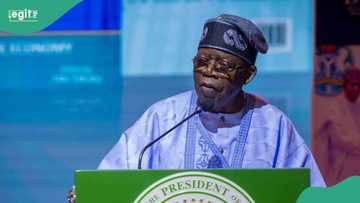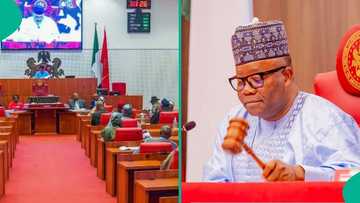President Tinubu’s Salary: How Much Nigerian President and Ministers Earn Every Month
- Nigeria’s Revenue Mobilisation Allocation and Fiscal Commission (RMAFC) has launched a review of political office holders’ salaries, sparking widespread debate across the country
- Chairman Mohammed Shehu argued that current pay levels for top officials are outdated and disproportionately low compared to their responsibilities and agency counterparts
- While some Nigerians criticised the move amid economic hardship, others welcomed it as a step toward fiscal fairness and reform
The Revenue Mobilisation Allocation and Fiscal Commission (RMAFC) has initiated a review of the salaries of Nigeria’s political office holders, a move that has stirred widespread reactions across the country.
The announcement followed the Commission’s decision to reassess the current Revenue Allocation Formula between the federal, state, and local governments. RMAFC Chairman, Mohammed Shehu, disclosed during a press briefing in Abuja that the salaries currently paid to politicians were “too small, unrealistic and outdated” given their growing responsibilities and the nation’s economic challenges.

Read also
"N1.5m for president is poor": FG declares, to begin review of salaries of govs, ministers, others

Source: Facebook
Shehu revealed that President Bola Tinubu earns a monthly salary of ₦1.5 million (approximately $977), while ministers receive less than ₦1 million. He argued that such figures were inadequate for the scale of governance expected in a country of over 200 million people.
"You dey pay di President of di Federal Republic of Nigeria 1.5m naira a month, wit a population of ova 200 million pipo. You no fit pay minister less dan one million naira per month since 2008 and expect am to put im best and e no go involve for oda tins."
Disparity in public sector salaries
Shehu further criticised the disparity in earnings between political office holders and heads of government agencies. He stated that the Governor of the Central Bank of Nigeria and Directors-General earn salaries up to ten times higher than the President.
"E no dey not right. Or you pay am [di head of an agency twenty times higher dan di Attorney-General of di Federation. E no dey right at all," he added.
The RMAFC chairman noted that the last comprehensive review of the revenue allocation formula was conducted in 1992, with only minor adjustments made through executive orders from 2002 to date. He described the current exercise as a constitutional obligation that had become imperative due to Nigeria’s evolving socio-economic and political landscape.
Why RMAFC is reviewing politicians’ salaries
Shehu explained that the review aimed to produce a fair, just, and equitable revenue-sharing formula that reflects the responsibilities, needs, and capacities of the three tiers of government. He cited recent constitutional amendments that transferred responsibilities such as power generation, railways, and correctional services to subnational governments, thereby increasing their financial and administrative burdens.
"Di recent constitutional amendments, wey share responsibilities like power generation, railways, and correctional services to subnational govment don place financial and administrative burdens on dem. Dis situation don make am essential to re-evaluate di structure of fiscal federalism to foster economic growth and ensure sustainability," he said.

Read also
How much senators earn uncovered and how it's capable of paying salaries of over 4000 professors
Under the current formula, the federal government receives 52.6%, states get 26.7%, and local governments are allocated 20.6%. Additionally, one percent each is assigned to the Federal Capital Territory, ecological fund, natural resources, and the stabilisation fund.
Shehu cited Paragraph 32 (b), Part I of the Third Schedule of the 1999 Constitution (as amended), which mandates the Commission to periodically review the revenue allocation formula to ensure it aligns with changing realities.
"In line wit dis constitutional responsibility and in response to di evolving socio-economic, political, and fiscal realities of our nation, di commission don reolve to initiate di process of reviewing di revenue allocation formula to reflect emerging socio-economic realities."
Public reaction to proposed salary increase
The announcement has drawn mixed reactions from Nigerians. While some citizens questioned the rationale behind increasing the salaries of politicians who are perceived to live lavishly, others welcomed the initiative as a progressive step.
Critics pointed to the government’s struggle to implement a ₦70,000 minimum wage for civil servants, arguing that the proposed salary adjustments for politicians were insensitive to the economic hardship faced by ordinary Nigerians.
Supporters, however, described the move as a necessary reform that could enhance accountability and performance among political office holders.
Source: Legit.ng




